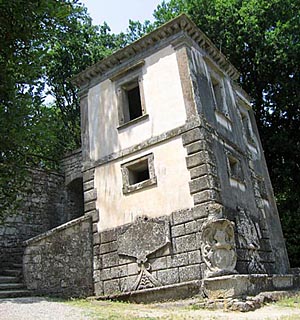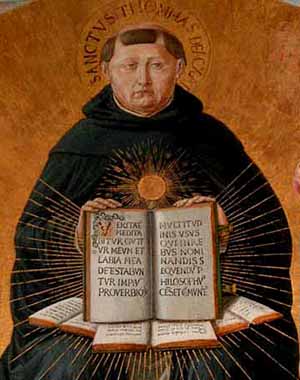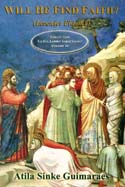 |
Consequences of Vatican II
Philosophy Then and Now
Lyle J. Arnold, Jr.
In the 126th Psalm, King David warns us, "Unless the Lord builds the house: they labor in vain that build it." Houses must be built on foundations that are slide-rule perfect, lest they tilt. King David's teaching, of course, goes beyond houses. He means that without grace, whatever we do is in vain.

A firm house needs a strong foundation.
The Church must rely on a consistent philosophy |
Philosophy is like this, and especially so. There must be no flaws, it must be perfect. In his Epistle to the Colossians, St. Paul's words about philosophy are interesting in this regard:
"Beware lest any man cheat you by philosophy and vain deceit; according to the tradition of men according to the elements of the world and not according to Christ" (2:8).
Writing about the mentality that overthrew the Middle Ages, Prof. Plinio Correa de Oliveira noted that by the 15th century, "The appetite of men for earthly pleasures [was] transformed into a burning desire." They were increasingly attracted to "a life filled with delights of fancy and the senses."
The professor went on to say what happened when this mentality penetrated the intellectual sphere:
"This moral climate produced clear manifestations of pride, such as a taste for ostentatious and vain disputes, for inconsistent tricks of argument and for fatuous exhibitions of learning. It encouraged old philosophical tendencies, over which Scholasticism had already triumphed." (1)
Now then, it matters nothing whether it be "old philosophical tendencies" or new ones that lead men into error. Scholasticism's foundation was slide-rule perfect, and therefore blocked the program of Progressivism. It had to go, and in the wake of Vatican II it was replaced with something new. Why, exactly, was Scholasticism perfect? And what, exactly, took its place?
It was perfect because it brought "harmony between the laws of being and the laws of thought. Objectivity of our knowledge in the light of being." (2)
Important words, these. When we examine a thing, we do so as it exists in being. The method of this examination must be divorced from the clutter of our subjective thoughts. Any method of inquiry that seeks the truth must place the object first, and this is exactly what Scholasticism does. For this reason Pope St. Pius X said that Catholicism cannot be understood scientifically without utilizing the major theses of St. Thomas Aquinas, the father of Scholasticism. (3)
The philosophy of John Paul II, known as Phenomenology, replaced Thomism, and locked Catholics globally into the progressivist New Church. Its method directly violates the principle of placing the object first, by taking "consciousness as its starting point, as Descartes did." (4) This is a problem of vital concern, because "for knowledge to be objective it is essential that things, not thoughts, be known first." (5) Whereas, "phenomenology sees reality as essentially relative and subjective." (6)
Fr. Karol Wojtyla wrote his philosophical doctoral dissertation on Max Scheler, an associate of Edmund Husserl. (7) About Husserl the following was written:

Restoring the Church means returning to the sound foundation of St. Thomas in Philosophy |
"Existentialism is a philosophical movement characterized by an emphasis on subjectivity. It was inspired mainly by the German philosophers Edmund Husserl and Martin Heidegger. It, like the rest of the pus-filled growth on the back of philosophy called post-Modernism, should be disregarded by any philosophy that has a desire to know what is true and what is false." (8)
To repeat, a house built on a bad foundation will end up tilting. This means tearing the building down and beginning over. Phenomenology begins with self, which was the temptation of Lucifer. When God commanded adoration and reverence from the angelic realm, it caused a temptation for Lucifer, for he "was divided in his will between himself and the infallible truth of the Lord." (9) Simply put, Lucifer violated the rule later codified by St. Thomas Aquinas, whereby focus on the object must be pure; it must not become entangled with self.
The house of God has been tilted for a long time. The progressivist New Church has to come down, its existentialist foundation has to be jack-hammered and buried in the hinterland.
Ninety years ago on July 13, 1917, Our Lady of Fatima warned us that "several nations will be annihilated." Perhaps the present foundation and its tilted house must wait until then to be removed. In the Reign of Mary, her children will return to consulting the slide-rule to check its calculations, returning the foundation of St. Thomas Aquinas to its rightful place in the Catholic Church.
1. Plinio Correa de Oliveira, Revolution and Counter-Revolution, New Rochelle, NY: Foundation for a Christian Civilization, 1980, p. 30.
2. P. Parente, A. Piolanti, S. Garofalo, Dictionary of Dogmatic Theology, Milwaukee: Bruce Publiher, 1951, p. 283.
3. Doctoris Angelici, June 29, 1914.
4. John Young, Reasoning Things Out, Fort Worth: Stella Maris Books, 1982, p. 70.
5. Ibid, p. 13.
6. Dictionary of Ideas, London: Brockhampton Press, 1994, p . 405.
7. Steve Payne, "Edith Stein - A Fragmented Life," 1998.
8.”What is Existentialism?" Philosophy Forum, Darkcrow, March 26, 2004.
9. Mary of Agreda, Mystical City of God, NJ: Ave Maria Institute, vol. 1, pp. 64-65.

Posted June 27, 2007

Related Topics of Interest
 St. Thomas Aquinas Against Socialism St. Thomas Aquinas Against Socialism
 The Virtues of St. Thomas The Virtues of St. Thomas
 Aquinas and His Teaching on the Veil Aquinas and His Teaching on the Veil
 St. Thomas in Favor of the Death Penalty St. Thomas in Favor of the Death Penalty
 St. Thomas on Heretics St. Thomas on Heretics
 St. Thomas on the Mystical Body of the Devil St. Thomas on the Mystical Body of the Devil
 A Religious Order Can Wage War A Religious Order Can Wage War
 Fr. Chenu: The Church Must Abandon Thomism Fr. Chenu: The Church Must Abandon Thomism



|
Vatican II | Hot Topics | Home | Books | CDs | Search | Contact Us | Donate

© 2002-
Tradition in Action, Inc. All Rights Reserved
|
 |
|